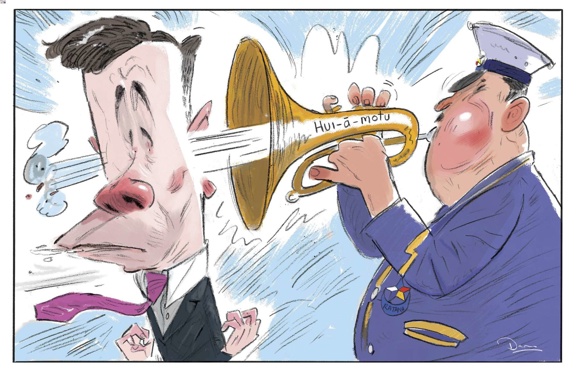
The Government didn't receive the warmest of receptions at Rātana yesterday as the backdrop of a controversial Treaty of Waitangi bill reading looms, but the bill's founder remains optimistic that support for it will soon grow.
Prime Minister Christopher Luxon arrived at Rātana yesterday along with his Deputy Prime Minister and coalition partner Winston Peters as Māori leaders sought to challenge the proposed Treaty Principles Bill.
The bill was introduced by Act leader David Seymour, who had voiced his desire to see the principles of the treaty defined throughout his election campaign and managed to force a first reading of the bill in Parliament into his three-way coalition agreement with Luxon and Peters.
On Wednesday, Luxon was adamant that the agreement with Seymour was only to get the bill into a first reading before a select committee, never any further.
"As a coalition government, we came together - I appreciate that Act want to take a bill to referendum, we don't support that as a National Party. We have no intention and no commitment to take it beyond the first reading," Luxon told the media.
Seymour did not attend the hui at Rātana, but still had thoughts on the exchange. He spoke to The Mike Hosking Breakfast with Tim Dower this morning.
He said every year the hui would support a range of views being expressed, although he wondered about the ratio of "heat to light".
"Basically, our country needs to have a discussion about the meddling of our treaty and that's why we brought the Treaty [Principles] Bill to Parliament in order to do it," he said.
Dower asked if Seymour wanted to rewrite the Treaty, to which the Act leader rejected the suggestion and explained the concept of what the bill attempted to do.
"We're talking about the principles that the courts have effectively been inventing over the last 40 years - they need to be defined democratically rather than by the court, Waitangi Tribunal or the public service," he said.
"And we want to put a bill up to parliament and debate it to give everybody a say on what our founding document and our constitutional future actually mean."
Seymour explained further, stating that everybody today would sign up to the principles of the Treaty, but that it was a workaround due to them not wanting to have to deal with the fact that there are two versions of the treaty - the English and Māori versions.

"The Treaty principles are the lens through which we see the Treaty today, and I think actually if they're properly defined, if they're safe for reflection on what the two texts say, then we'll be in a much better place," he said.
"Because actually, what the treaty says is the government has the right to govern, people have the right to tino rangatiratanga- or the right to self-determination over themselves and their property - and we all have the same rights and duties.
"Now, once you take those meanings, you've got the basis of a country with a government with property rights, with self-determination and equality before the law, it's actually not a bad thing.
"But that's far from what we've got over the last four years where the treaty is the [considered] "partnership between races" - because when you take that approach, you've got to figure out what race you are before you know what your rights are."
Seymour was asked about the lack of support coming from his coalition partner and the country's newly elected leader, Christopher Luxon.
Luxon has been outspoken about the National Party's desire not to push the bill any further than a first reading, the party's Māori Development Minister reiterated this during a Newstalk ZB interview earlier this week.
It was put to Seymour that it could be suggested Luxon was playing the bill down in public but giving much stronger support for the bill to Seymour in private.
Seymour said even if Luxon had done so, the Act leader wouldn't divulge that fact.
"But he's not - he honoured his commitment to get it to first reading and, after that, they have no commitment to it either way, which is what he said in public," he said.
Despite this, Seymour believes the next steps for the bill following its first reading will have little to do with what the National and NZ First parties desire - as the public's say on the matter will play a big part.
He said the principles debate was one the country needed to have, that the principles need to be discussed democratically and that the starting point for its discussion was the country's universal right for all people to be equal.
"Now, if we do all of that, I suspect it will be more popular than National and NZ First [believe it would be] today, and we might just see their support continue," he said.
"But let's see the bill continue afterwards, [let's] see it debated, and then make up our mind before we get too ahead of ourselves."
Take your Radio, Podcasts and Music with you









